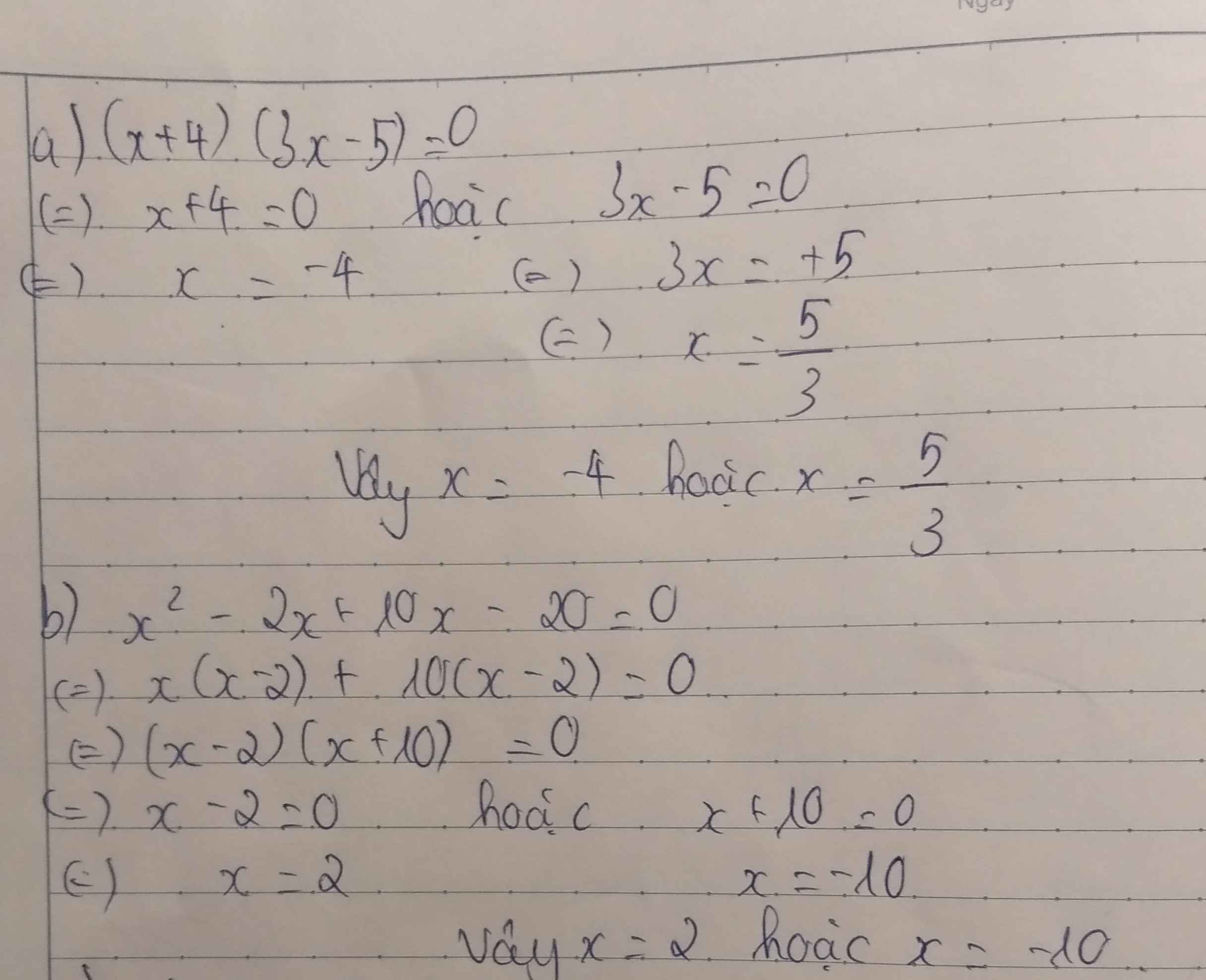
Hãy nhập câu hỏi của bạn vào đây, nếu là tài khoản VIP, bạn sẽ được ưu tiên trả lời.


a: =>3x+10-2x=0
hay x=-10
c: \(\Leftrightarrow3x^2-3x^2+6x=36\)
=>6x=36
hay x=6

\(a,\Leftrightarrow2x^2+10x-2x^2=12\Leftrightarrow x=\dfrac{12}{10}=\dfrac{6}{5}\\ b,\Leftrightarrow\left(5-2x-4\right)\left(5-2x+4\right)=0\\ \Leftrightarrow\left(1-2x\right)\left(9-2x\right)=0\Leftrightarrow\left[{}\begin{matrix}x=\dfrac{1}{2}\\x=\dfrac{9}{2}\end{matrix}\right.\\ c,\Leftrightarrow3x^2-3x^2+6x=36\Leftrightarrow x=6\\ d,\Leftrightarrow2\left(x+5\right)-x\left(x+5\right)=0\\ \Leftrightarrow\left(2-x\right)\left(x+5\right)=0\Leftrightarrow\left[{}\begin{matrix}x=2\\x=-5\end{matrix}\right.\\ e,\Leftrightarrow4x^2-4x+1-4x^2+196=0\\ \Leftrightarrow-4x=-197\Leftrightarrow x=\dfrac{197}{4}\)
\(f,\Leftrightarrow x^2+8x+16-x^2+1=16\Leftrightarrow8x=-1\Leftrightarrow x=-\dfrac{1}{8}\\ g,Sửa:\left(3x+1\right)^2-\left(x+1\right)^2=0\\ \Leftrightarrow\left(3x+1-x-1\right)\left(3x+1+x+1\right)=0\\ \Leftrightarrow2x\left(4x+2\right)=0\Leftrightarrow\left[{}\begin{matrix}x=0\\x=-\dfrac{1}{2}\end{matrix}\right.\\ h,\Leftrightarrow x^2+8x-x-8=0\\ \Leftrightarrow\left(x+8\right)\left(x-1\right)=0\Leftrightarrow\left[{}\begin{matrix}x=1\\x=-8\end{matrix}\right.\\ i,\Leftrightarrow2x^2-13x+15=0\\ \Leftrightarrow2x^2+2x-15x-15=0\\ \Leftrightarrow\left(x+1\right)\left(2x-15\right)=0\Leftrightarrow\left[{}\begin{matrix}x=-1\\x=\dfrac{15}{2}\end{matrix}\right.\)

Bài 1:
a: \(=6x^3-10x^2+6x\)
b: \(=-2x^3-10x^2-6x\)
Bài 4:
a: =>3x+10-2x=0
=>x=-10
c: =>3x2-3x2+6x=36
=>6x=36
hay x=6
Bài 1:
\(a,=6x^3-10x^2+6x\\ b,=-2x^3-10x^2-6x\)
Bài 4:
\(a,\Leftrightarrow3x+10-2x=0\Leftrightarrow x=-10\\ b,\Leftrightarrow x\left(2x^2+9x-5\right)-\left(2x^3+9x^2+x+4,5\right)=3,5\\ \Leftrightarrow2x^3+9x^2-5x-2x^3-9x^2-x-4,5=3,5\\ \Leftrightarrow-6x=8\Leftrightarrow x=-\dfrac{4}{3}\\ c,\Leftrightarrow3x^2-3x^2+6x=36\Leftrightarrow x=6\)
Bài 1:
\(a,=7xy\left(2x-3y+4xy\right)\\ b,=x\left(x+y\right)-5\left(x+y\right)=\left(x-5\right)\left(x+y\right)\\ c,=\left(x-y\right)\left(10x+8\right)=2\left(5x+4\right)\left(x-y\right)\\ d,=\left(3x+1-x-1\right)\left(3x+1+x+1\right)\\ =2x\left(4x+2\right)=4x\left(2x+1\right)\\ e,=5\left[\left(x-y\right)^2-4z^2\right]=5\left(x-y-2z\right)\left(x-y+2z\right)\\ f,=x^2+8x-x-8=\left(x+8\right)\left(x-1\right)\\ g,\left(x+y\right)^3-\left(x+y\right)=\left(x+y\right)\left[\left(x+y\right)^2-1\right]\\ =\left(x+y\right)\left(x+y-1\right)\left(x+y+1\right)\\ h,=x^2+3x+x+3=\left(x+3\right)\left(x+1\right)\)


\(a,\Rightarrow2x^2-18x-2x^2=0\\ \Rightarrow-18x=0\Rightarrow x=0\\ b,\Rightarrow2x^2-5x-12+x^2-7x+10=3x^2-17x+20\\ \Rightarrow5x=22\Rightarrow x=\dfrac{22}{5}\)

Câu 1:
\(2x^3-3x^2+x+a\)
\(=2\left(x^3-6x^2+12x-8\right)+9\left(x^2-4x+4\right)+13\left(x-2\right)+\left(6+a\right)\)
\(=2\left(x-2\right)^3+9\left(x-2\right)^2+13\left(x-2\right)+\left(6+a\right)\)chia hết cho \(x-2\)khi và chỉ khi :
\(6+a=0\Leftrightarrow a=-6\). Vậy \(a=-6\).
Câu 2:
\(\left(x+1\right)\left(2x-x\right)-\left(3x+5\right)\left(x+2\right)=4x^2+1\)
\(\Leftrightarrow x^2+x-\left(3x^2+11x+10\right)=-4x^2+1\)
\(\Leftrightarrow x^2+x-3x^2-11x-10+4x^2-1=0\)
\(\Leftrightarrow2x^2-10x-11=0\)
\(\Delta'=\left(-5\right)^2-2\left(-11\right)=47>0\)
\(\Rightarrow\)Phương trình có 2 nghiệm phân biệt:
\(x=\frac{5+\sqrt{47}}{2}\)hoặc \(x=\frac{5-\sqrt{47}}{2}\)
Vậy phương trình có tập nghiệm \(S=\left\{\frac{5+\sqrt{47}}{2};\frac{5-\sqrt{47}}{2}\right\}\)

a. (2x + 1)2 - 4x2 + 2x2 - 2 = 0
<=> (2x + 1 - 2x)(2x + 1 + 2x) + 2(x2 - 1) = 0
<=> (4x + 1) + 2x2 - 2 = 0
<=> 4x + 1 + 2x2 - 2 = 0
<=> 2x2 + 4x - 2 + 1 = 0
<=> 2x2 + 4x - 1 = 0
<=> 2x2 + 4x = 1
<=> 2x(x + 2) = 1
Vì 1 chỉ có tích là 1 . 1 nên:
<=> \(\left[{}\begin{matrix}2x=1\\x+2=1\end{matrix}\right.\Leftrightarrow\left[{}\begin{matrix}x=\dfrac{1}{2}\\x=-1\end{matrix}\right.\)
\(a,\Leftrightarrow4x^2+4x+1-4x^2+2x^2-2=0\\ \Leftrightarrow2x^2+4x-1=0\\ \Leftrightarrow2\left(x^2+2x+1\right)-3=0\\ \Leftrightarrow2\left(x+1\right)^2-3=0\\ \Leftrightarrow\left(x+1\right)^2=\dfrac{3}{2}\\ \Leftrightarrow\left[{}\begin{matrix}x+1=\sqrt{\dfrac{3}{2}}\\x+1=-\sqrt{\dfrac{3}{2}}\end{matrix}\right.\Leftrightarrow\left[{}\begin{matrix}x=\dfrac{-2-\sqrt{6}}{2}\\x=\dfrac{-2+\sqrt{6}}{2}\end{matrix}\right.\)
\(b,\left(x-2\right)\left(x+2\right)-\left(x+3\right)^2-2x-5=0\\ \Leftrightarrow x^2-4-x^2-6x-9-2x-5=0\\ \Leftrightarrow-8x=18\\ \Leftrightarrow x=-\dfrac{9}{4}\)

Answer:
\(3x+2\left(5-x\right)=0\)
\(\Rightarrow3x+10-2x=0\)
\(\Rightarrow x+10=0\)
\(\Rightarrow x=-10\)
\(x\left(2x-1\right)\left(x+5\right)-\left(2x^2+1\right)\left(x+4,5\right)=3,5\)
\(\Rightarrow\left(2x^2-x\right)\left(x+5\right)-2x^3-x-9x^2-4,5=3,5\)
\(\Rightarrow2x^3-x^2+10x^2-5x-2x^3-x-9x^2=3,5+4,5\)
\(\Rightarrow\left(2x^3-2x^3\right)+\left(-x^2+10x^2-9x^2\right)+\left(-5x-x\right)=8\)
\(\Rightarrow-6x=8\)
\(\Rightarrow x=\frac{-4}{3}\)